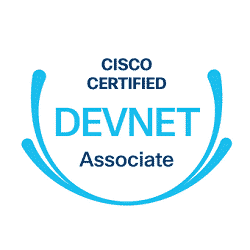Obiettivi | Certificazione | Contenuti | Tipologia | Prerequisiti | Durata e Frequenza | Docenti | Modalità di Iscrizione | Calendario

Il Corso DEVASC Developing Applications and Automating Workflows using Cisco Core Platforms prepara i partecipanti per i nuovi ruoli professionali capaci di intercettare i cambiamenti dei paradigmi delle reti e delle infrastrutture. Questa corso introduce alle competenze di base dei nuovi professionisti nella network programmability, nel DevOps e nell’automazione delle reti. Il programma è strutturato per trasferire quelle conoscenze tecniche chiave emergenti per un nuovo tipo di professionista IT, indispensabile alle organizzazioni per sfruttare il potenziale delle automazioni nell’ambito dell’Internet of Things (IoT), Data Center, Cloud e del mondo Software-Defined e del DevOps in generale. I programmi formativi Cisco sono già conosciuti in tutto il mondo come i più importanti e accreditati nelle tematiche del networking, security, datacenter e collaboration. L’avvento dei programmi DevNet sancisce una svolta verso il software, la programmazione, lo sviluppo di applicazioni, il DevOps e l’automazione. Esattamente in linea nella tendenza incontrovertibile della convergenza dell’hardware e del software in un unicum indistinguibile. In particolare questo corso è orientato sulle seguenti tematiche: software development, software design, comprendere ed utilizzare la APIs, application deployment e application security, automazione e workflows con Cisco Core Platforms. Il corso contribuisce alla preparazione dell’esame di Certificazione Cisco DevNet Associate (Esame 200-901).
Contattaci ora per ricevere tutti i dettagli e per richiedere, senza alcun impegno, di parlare direttamente con uno dei nostri Docenti (Clicca qui)
oppure chiamaci subito al nostro Numero Verde (800-177596)
Obiettivi del corso
Di seguito una sintesi degli obiettivi principali del Corso DEVASC Developing Applications and Automating Workflows using Cisco Core Platforms:
- Introduzione alle competenze di base nella network programmability.
- Approfondimento sul DevOps e sull’automazione delle reti.
- Conoscenza delle tematiche di software development e software design.
- Comprensione e utilizzo delle APIs.
- Focalizzazione su application deployment, application security e automazione con Cisco Core Platforms.
Certificazione del corso
Esame 200-901 DEVASC DevNet Associate;
Il programma di certificazione Cisco DevNet prepara per i nuovi ruoli professionali atti ad intercettare i cambiamenti dei paradigmi delle reti e delle infrastrutture. Questa certificazione convalida le competenze di base dei nuovi professionisti nella network programmability, nel DevOps e nell’automazione delle reti. Il programma certifica le competenze tecniche chiave emergenti per un nuovo tipo di professionista IT, indispensabile alle organizzazioni per sfruttare il potenziale delle automazioni nell’ambito dell’Internet of Things (IoT), Data Center, Cloud e del mondo Software-Defined in generale. La Certificazione DevNet Associate, convalida le conoscenze fondamentali e rappresenta il primo step verso le certificazioni DevNet di livello professional.
Contenuti del corso
- Practicing Modern Software Development
- Rise of APIs in Software Design
- API Data Formats
- Serialization and Deserialization of Data
- Parse API Data Formats with Python
- Collaborative Software Development
- Version Control with Git
- Branching with Git
- Use Git for Version Control
- Describing Software Development Process
- Software Development Methodologies
- Test-Driven Development
- TDD Example
- Code Review
- Designing Software
- Modular Software Design
- Modular Design Benefits
- Architecture and Design Patterns
- MVC Architecture Pattern
- Observer Design Pattern
- Identify Software Architecture and Design Patterns on a Diagram
- Implement Singleton Pattern and Abstraction-Based Method
- Introducing Network-Based APIs
- HTTP Overview
- HTTP Applied to Web-Based APIs
- Inspect HTTP Messages
- HTTP Content Negotiation
- RPC-Style APIs
- REST-Style APIs
- Postman for REST API Consumption
- Use Postman
- Advanced Postman Topics
- Troubleshoot an HTTP Error Response
- Consuming Notification Events Using Webhooks
- Consuming REST-Based APIs
- Common API Constraints
- API Authentication Mechanisms
- Using HTTP Authentication
- Utilize APIs with Python
- Leveraging HTTPS for Security
- Handling Secrets for API Consumption
- Introducing Cisco Platforms and APIs
- Cisco Network Management Platforms
- Cisco Compute Management Platforms
- Cisco Compute Management APIs
- Cisco Collaboration Platforms
- Cisco Collaboration APIs
- Cisco Security Platforms
- Cisco Security APIs
- Cisco Network Management Platforms in Cloud
- Employing Programmability on Cisco Platforms
- Automating Cisco Network Operations
- Cisco IOS XE Device-Level APIs
- Cisco NX-OS Device-Level APIs
- Cisco Controller APIs
- Use the Cisco Controller APIs
- Automating Cisco Webex Teams Operations
- Use the Cisco Webex Teams Collaboration API
- DevNet Developer Resources
- Describing IP Networks
- Basic Networking Concepts
- MAC Addresses and VLANs
- Network Routes and Routing
- Transport Layer and Packet Delivery
- Interpret a Basic Network Topology Diagram
- Network Device Planes
- Relating Network and Applications
- Standard IP Network Services
- Network Address Translation
- Common Protocols
- Application Connectivity Issues
- Tools for Troubleshooting Connectivity Issues
- Identify the Cause of Application Connectivity Issues
- Explaining the Impact of Network Constraints on Applications
- Employing Model-Driven Programmability
- Model-Driven Programmability Stack
- Network Automation and NETCONF
- Exploring YANG Models
- Perform Basic NETCONF Operations
- Utilizing Data Models with RESTCONF Protocol
- Using Python Scripts and Cisco SDKs
- Use Cisco SDK and Python for Automation Scripting
- Model Driven Programmability in a Cisco Environment
- Deploying Applications
- Application Deployment Types
- Application Deployment Models
- Edge Computing Overview
- DevOps Practices and Principles
- Components of a CI-CD Pipeline
- Essential Bash Commands for Development and Operations
- Utilize Bash Commands for Local Development
- Automating Infrastructure
- SDN and Intent-Based Networking
- Infrastructure as Code
- System Management with Ansible
- Infrastructure Automation with Ansible Playbooks
- Construct Infrastructure Automation Workflow
- CI/CD Pipelines for Infrastructure Automation
- Testing and Securing Applications
- Software Test Types
- Verifying Code Behavior with Unit Tests
- Construct a Python Unit Test
- Dockerfile Composition
- Interpret a Dockerfile
- Using Docker in a Local Developer Environment
- Utilize Docker Commands to Manage Local Developer Environment
- Application Security
- Securing and Scaling Application Ingress Traffic
- Exploit Insufficient Parameter Sanitization
- Network Simulation and Test Tools
- Lab Code Reference
- Downloadable Code Per Lab
Attività Laboratoriali
- Parse API Data Formats with Python
- Use Git for Version Control
- Identify Software Architecture and Design Patterns on a Diagram
- Implement Singleton Pattern and Abstraction-Based Method
- Inspect HTTP Protocol Messages
- Use Postman
- Troubleshoot an HTTP Error Response
- Utilize APIs with Python
- Use the Cisco Controller APIs
- Use the Cisco Webex Teams™ Collaboration API
- Interpret a Basic Network Topology Diagram
- Identify the Cause of Application Connectivity Issues
- Perform Basic Network Configuration Protocol (NETCONF) Operations
- Use Cisco Software Development Kit (SDK) and Python for Automation Scripting
- Utilize Bash Commands for Local Development
- Construct a Python Unit Test
- Interpret a Dockerfile
- Utilize Docker Commands to Manage Local Developer Environment
- Exploit Insufficient Parameter Sanitization
- Construct Infrastructure Automation Workflow
Tipologia
Corso di Formazione con Docente
Docenti
I docenti sono Istruttori accreditati CISCO e certificati in altre tecnologie IT, con anni di esperienza pratica nel settore e nella Formazione.
Infrastruttura laboratoriale
Per tutte le tipologie di erogazione, il Corsista può accedere alle attrezzature e ai sistemi reali Cisco presenti nei Nostri laboratori o direttamente presso i data center Cisco in modalità remota h24. Ogni partecipante dispone di un accesso per implementare le varie configurazioni avendo così un riscontro pratico e immediato della teoria affrontata. Ecco di seguito alcune topologie di rete dei Laboratori Cisco Disponibili:

Dettagli del corso
Prerequisiti
Si consiglia la partecipazione al Corso Cisco CCNA e Python Developer.
Durata del corso
- Durata Intensiva 5gg;
Frequenza
Varie tipologie di Frequenza Estensiva ed Intensiva.
Date del corso
- Corso Cisco DEVASC (5gg) – Su richiesta – 9:00 – 17:00
Modalità di iscrizione
Le iscrizioni sono a numero chiuso per garantire ai tutti i partecipanti un servizio eccellente.
L’iscrizione avviene richiedendo di essere contattati dal seguente Link, o contattando la sede al numero verde 800-177596 o inviando una richiesta all’email contatti@vegatraining.eu.


